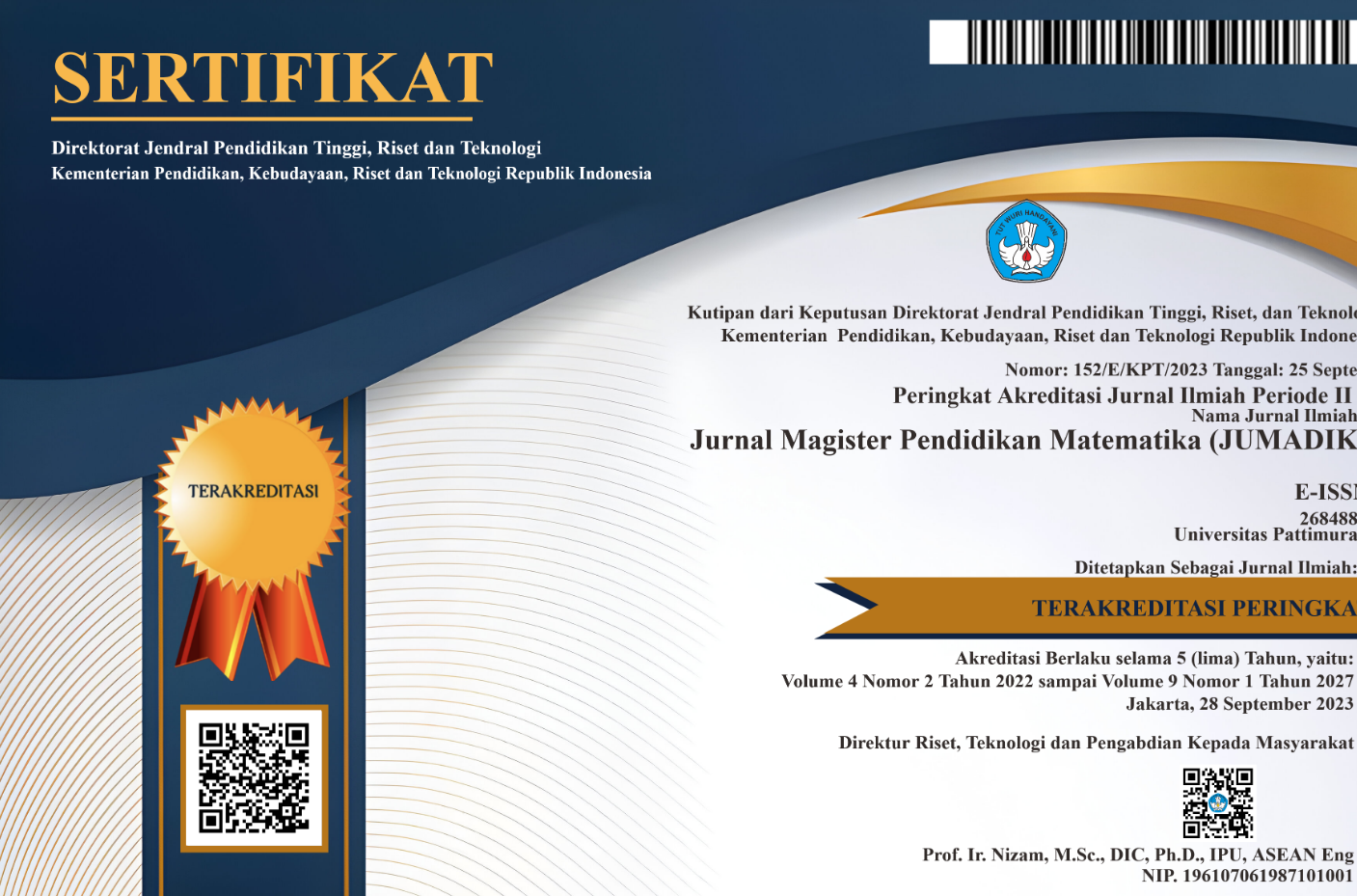EFEKTIFITAS PEMBELAJARAN BERBASIS m-PBL DALAM MENUNJANG PEMBELAJARAN MATEMATIKA SECARA DARING
Abstract
Saat ini, Pendidikan di Indonesia telah memasuki era baru yakni melakukan proses pembelajaran online atau via daring. Namun, sayangnya beberapa teknologi yang ada masih belum digunakan secara optimal dalam memfasilitasi belajar matematika secara daring. Adapun studi ini mencoba menggabungkan pembelajaran berbasis seluler (Mobile Learning) dengan mengikuti sintaks Problem Based Learning (PBL) yang dikemas menjadi metode m-PBL. Tujuan penelitian ini adalah menguji keefektifan m-PBL dengan PBL konvensional pada keterampilan pemecahan masalah matematika dan juga mencari tanggapan siswa tentang proses pembelajaran m-PBL. Penelitian ini merupakan penelitian eksperimen dengan one group pretest posttest design. Adapun sampel pada penelitian ini melibatkan 234 siswa yang dipilih secara acak dari Sekolah Menengah Kejuruan yang ada di Kabupaten Probolinggo Jawa Timur. Instrumen penelitian yang digunakan dalam penelitian ini adalah tes dan angket yang akan dianalisis melalui uji independent sample t-test dan uji N-Gain Score. Temuan penelitian mengungkapkan bahwa keterampilan pemecahan masalah matematis siswa yang diberi perlakuan pembelajaran berbasis m-PBL lebih tinggi daripada siswa yang diberi pembelajaran PBL Konvensional. Selain itu juga, siswa telah menanggapi secara positif penggunaan pembelajaran m-PBL. Bahkan 92% responden berpendapat bahwa m-PBL dapat mempermudah mengakses pembelajaran. Lebih lanjut, beberapa temuan atas dampak m-PBL saat pembelajaran matematika juga akan dibahas pada artikel ini.
Downloads
References
Banawi, A., Sopandi, W., Kadarohman, A., & Solehuddin, M. (2019). Prospective primary school teachers’ conception change on states of matter and their changes through predict-observe-explain strategy. International Journal of Instruction, 12(3). https://doi.org/10.29333/iji.2019.12322a
Blackwell, J. A., & Roseth, N. E. (2018). Problem-Based Learning in a Woodwind Methods Course: An Action Research Study. Journal of Music Teacher Education. https://doi.org/10.1177/1057083718769262
Bray, A., & Tangney, B. (2016). Enhancing student engagement through the affordances of mobile technology: a 21st century learning perspective on Realistic Mathematics Education. Mathematics Education Research Journal. https://doi.org/10.1007/s13394-015-0158-7
Cheon, J., Lee, S., Crooks, S. M., & Song, J. (2012). An investigation of mobile learning readiness in higher education based on the theory of planned behavior. Computers and Education. https://doi.org/10.1016/j.compedu.2012.04.015
Delialioglu, O., & Yildirim, Z. (2007). Students’ perceptions on effective dimensions of interactive learning in a blended learning environment. Journal of Educational Technology & Society, 10(2), 133–146.
Donnelly, R. (2006). Blended problem-based learning for teacher education: Lessons learnt. Learning, Media and Technology, 31(2). https://doi.org/10.1080/17439880600756621
Ghufron, M. A., & Ermawati, S. (2018). The strengths and weaknesses of cooperative learning and problem-based learning in EFL writing class: Teachers and students’ perspectives. International Journal of Instruction. https://doi.org/10.12973/iji.2018.11441a
Hitalessy, M., Mataheru, W., & Ayal, C. S. (2020). REPRESENTASI MATEMATIS SISWA DALAM PEMECAHAN MASALAH PERBANDINGAN TRIGONOMETRI PADA SEGITIGA SIKU-SIKU DITINJAU DARI KECERDASAN LOGIS MATEMATIS, LINGUISTIK DAN VISUAL SPASIAL. Jurnal Magister Pendidikan Matematika (JUMADIKA), 2(1). https://doi.org/10.30598/jumadikavol2iss1year2020page1-15
Hmelo-Silver, C. E., & Barrows, H. S. (2006). Goals and Strategies of a Problem-based Learning Facilitator. Interdisciplinary Journal of Problem-Based Learning, 1(1). https://doi.org/10.7771/1541-5015.1004
Kadek Suartama, I., Setyosari, P., Sulthoni, & Ulfa, S. (2020). Development of ubiquitous learning environment based on moodle learning management system. International Journal of Interactive Mobile Technologies. https://doi.org/10.3991/ijim.v14i14.11775
Kazemi, F., & Ghoraishi, M. (2012). Comparison of Problem-Based Learning Approach and Traditional Teaching on Attitude, Misconceptions and Mathematics Performance of University Students. Procedia - Social and Behavioral Sciences. https://doi.org/10.1016/j.sbspro.2012.06.159
Lestari, I., Maksum, A., & Kustandi, C. (2019). Mobile learning design models for State University of Jakarta, Indonesia. International Journal of Interactive Mobile Technologies. https://doi.org/10.3991/ijim.v13i09.10987
Lestari, W., Pratama, L. D., & ... (2020). Persepsi Guru dan Siswa Tentang Penggunaan Media Edutainment di Tengah Pandemi Covid-19. Jurnal Pendidikan ….
Li, Y., & Schoenfeld, A. H. (2019). Problematizing teaching and learning mathematics as “given†in STEM education. In International Journal of STEM Education. https://doi.org/10.1186/s40594-019-0197-9
Lopes, R. M., Hauser-Davis, R. A., Oliveira, M. M., Pierini, M. F., de Souza, C. A. M., Cavalcante, A. L. M., Santos, C. R. Dos, Comarú, M. W., & da Fonseca Tinoca, L. A. (2020). Principles of problem-based learning for training and professional practice in ecotoxicology. In Science of the Total Environment. https://doi.org/10.1016/j.scitotenv.2019.134809
Marzouki, O. F., Idrissi, M. K., & Bennani, S. (2017). Effects of social constructivist mobile learning environments on knowledge acquisition: A meta-analysis. International Journal of Interactive Mobile Technologies. https://doi.org/10.3991/ijim.v11i1.5982
Masek, A., & Yamin, S. (2011). The effect of problem based learning on critical thinking ability: a theoretical and empirical review. International Review of Social Sciences and Humanities.
Mustofa, R. F., & Hidayah, Y. R. (2020). The effect of problem-based learning on lateral thinking skills. International Journal of Instruction, 13(1). https://doi.org/10.29333/iji.2020.13130a
Nurkhin, A., Kardoyo, Pramusinto, H., Setiyani, R., & Widhiastuti, R. (2020). Applying blended problem-based learning to accounting studies in higher education; Optimizing the utilization of social media for learning. International Journal of Emerging Technologies in Learning, 15(8). https://doi.org/10.3991/IJET.V15I08.12201
Pratama, L. D., & Lestari, W. (2020). Pengaruh Pelatihan Terhadap Kompetensi Pedagogik. Jurnal Cendekia: Jurnal Pendidikan Matematika, 04(01), 278–285.
Pratama, Loviga Denny, Lestari, W., & Astutik, I. (2020). Efektifitas Penggunaan Media Edutainment Di Tengah Pandemi Covid-19. AKSIOMA: Jurnal Program Studi Pendidikan Matematika, 9(2). https://doi.org/10.24127/ajpm.v9i2.2783
Suartama, I. K., Setyosari, P., Sulthoni, & Ulfa, S. (2019). Development of an instructional design model for mobile blended learning in higher education. International Journal of Emerging Technologies in Learning. https://doi.org/10.3991/ijet.v14i16.10633
Susanti, R. D., & Effendi, M. M. (2020). Efektivitas Penggunaan Edmodo Dalam Pelaksanaan Ulangan Harian Matematika. Fibonacci Jurnal Pendidikan Matematika Dan Matematika, 6(1).
Umah, U., & Vitantri, C. A. (2019). representasi visual matematis mahasiswa dalam memodelkan kejadian dinamis ditinjau dari perbedaan gaya kognitif dan jenis kelamin. FIBONACCI: Jurnal Pendidikan Matematika Dan Matematika, 5(1). https://doi.org/10.24853/fbc.5.1.87-96
Wu, W. H., Jim Wu, Y. C., Chen, C. Y., Kao, H. Y., Lin, C. H., & Huang, S. H. (2012). Review of trends from mobile learning studies: A meta-analysis. Computers and Education. https://doi.org/10.1016/j.compedu.2012.03.016
Yew, E. H. J., & Goh, K. (2016). Problem-Based Learning: An Overview of its Process and Impact on Learning. Health Professions Education. https://doi.org/10.1016/j.hpe.2016.01.004
Copyright (c) 2021 Wahyu Lestari, Loviga Denny Pratama, Lifia Sulistiowati

This work is licensed under a Creative Commons Attribution-NonCommercial-ShareAlike 4.0 International License.
License and Copyright Agreement
In submitting the manuscript to the journal, the authors certify that:
- They are authorized by their co-authors to enter into these arrangements.
- The work described has not been formally published before, except in the form of an abstract or as part of a published lecture, review, thesis, or overlay journal. Please also carefully read Jurnal Magister Pendidikan Matematika (JUMADIKA) Posting Your Article Policy.
- That it is not under consideration for publication elsewhere,
- That its publication has been approved by all the author(s) and by the responsible authorities – tacitly or explicitly – of the institutes where the work has been carried out.
- They secure the right to reproduce any material that has already been published or copyrighted elsewhere.
- They agree to the following license and copyright agreement.
Copyright
Authors who publish with Jurnal Magister Pendidikan Matematika (JUMADIKA) agree to the following terms:
- Authors retain copyright and grant the journal right of first publication with the work simultaneously licensed under a Creative Commons Attribution-NonCommercial-ShareAlike 4.0 International License (http://creativecommons.org/licenses/by-nc-sa/4.0/) that allows others to share the work with an acknowledgment of the work's authorship and initial publication in this journal.
- Authors are able to enter into separate, additional contractual arrangements for the non-exclusive distribution of the journal's published version of the work (e.g., post it to an institutional repository or publish it in a book), with an acknowledgment of its initial publication in this journal.
- Authors are permitted and encouraged to post their work online (e.g., in institutional repositories or on their website) prior to and during the submission process, as it can lead to productive exchanges, as well as earlier and greater citation of published work.








